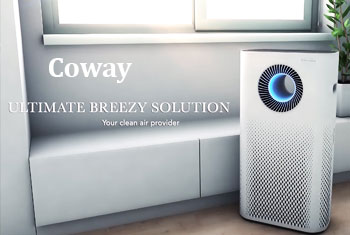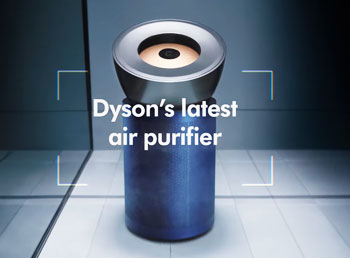Air purifiers have become an increasingly popular way to improve indoor air quality. Two of the top brands are Coway and Dyson, but which one is better?
This comprehensive guide compares the key features, performance, design, and value of Coway and Dyson air purifiers to help you decide which is best for your needs.
A Brief Comparison Table
| Feature | Coway | Dyson |
| Filtration | True HEPA + Carbon filter | HEPA + Carbon filter |
| Coverage | Up to 361 sq. ft. | Up to 248 sq. ft. |
| CADR Rating | 233 – 303 m3/h | Up to 240 m3/h |
| Noise Level | 24.4 – 53.8 dB | 64 dB max |
| Design | Tower, oval shape | Tower, round shape |
| Smart Features | Air quality monitor, filter change indicator | None |
| Warranty | 3 years | 2 years |
| Price | $100 – $400 | $400 – $650 |
Overview of Coway Air Purifiers
Coway air purifiers feature a distinctive slim, oval tower design. Inside each model is a 4-stage filtration system:
- Pre-filter – Catches large particles like hair and dust
- Carbon filter – Removes odors and volatile organic compounds (VOCs)
- True HEPA filter – Traps 99.97% of particles 0.3 microns, including pollen, mold, bacteria
- Vital Ion – Charges particles to enhance filtration

The combination of HEPA and activated carbon gives Coway air purifiers strong performance for removing both particles and odors.
Coway’s air purifiers cover rooms up to 361 square feet, with Clean Air Delivery Rates (CADR) ranging from 233 – 303 cubic meters per hour. This measures the unit’s effectiveness at removing dust, pollen, and smoke. The higher the CADR, the faster it can clean the air.
One handy feature is the air quality indicator, which displays the real-time air quality and changes color based on pollution levels. Coway models also have filter change indicators to alert you when it’s time to replace filters.
Operating noise ranges from 24.4 decibels on the lowest setting up to 53.8 dB on the highest setting. For comparison, 30 dB is a quiet library and 60 dB is normal conversation. So Coway purifiers run very quietly.
Coway air purifiers range in price from about $100 to $400 depending on the model and coverage size. The company provides a 3 year limited warranty. Overall Coway offers affordable, efficient, and smart air purifiers.
Overview of Dyson Air Purifiers
Dyson air purifiers feature a distinctive round, futuristic tower design. The main filtration is provided by HEPA filters that capture 99.97% of allergens and pollutants as small as 0.3 microns.
Models also include activated carbon filters to help remove household odors and some VOCs. However, Coway includes larger carbon filters for enhanced odor reduction.
Dyson air purifiers have Clean Air Delivery Rates up to 240 m3/hr, covering rooms up to 248 square feet effectively. So the performance is similar to Coway, though some Coway models provide greater coverage and airflow.
Dyson purifiers operate at noise levels up to 64 dB on the highest fan setting. That’s noticeably louder than Coway models which can run as low as 24 dB.
Smart features are lacking on Dyson air purifiers. They do not have air quality monitors or filter change alerts. You need to manually check the filters and replace them about once a year.
Dyson air purifiers range from $400 to $650, making them significantly more expensive than comparable Coway models. Dyson provides a 2 year limited warranty on parts.
Also Read: Comparison Between the Coway Airmega 150 and AP-1512HH
Key Differences Between Coway and Dyson air purifiers
Now let’s take a detailed, side-by-side look at some of the most important differences between Coway and Dyson air purifiers.
Filtration

- Coway uses a 4-stage filtration system with pre-filter, carbon filter, True HEPA filter, and Vital Ion.
- Dyson uses a 2-stage system with HEPA filter and activated carbon filter.
- Coway’s larger carbon filters adsorb more odors and VOCs than Dyson models. The vital ion technology also helps charge and catch particles.
- Both use true HEPA filters to remove 99.97% of particles 0.3 microns and larger.
Coverage and CADR
- Coway air purifiers cover rooms up to 361 square feet.
- Dyson models cover up to 248 square feet.
- Coway has CADR ratings from 233 to 303 m3/hr across models.
- Dyson has CADR ratings up to 240 m3/hr.
- So Coway generally provides greater coverage capacities and air circulation rates.
Noise Level
- Coway operates at 24.4 – 53.8 decibels on low to high settings.
- Dyson generates up to 64 dB of noise on the highest fan speed.
- Coway air purifiers run significantly quieter, especially on lower speeds. Dyson can get quite loud on turbo mode.
Design
- Coway has a slim, oval shaped tower design in white or black colors.
- Dyson has a round, futuristic tower design often in silver/gray or white.
- Controls on both are located on the top panel. The Dyson design may fit better in moderndecor, while Coway is more subdued.
Smart Features
- Coway air purifiers have air quality monitors to detect pollution levels.
- They also have filter change indicators to alert you when to change filters.
- Dyson lacks air quality sensors or filter change alerts. You’ll need to manually keep track of when to replace filters.
Warranty
- Coway offers a 3 year limited warranty covering defects and workmanship.
- Dyson provides a 2 year limited warranty on parts from manufacturing defects.
- Coway gives you an extra year of warranty coverage compared to Dyson.
Cost
- Coway air purifier prices range from about $100 to $400 depending on model and size.
- Dyson air purifiers cost between $400 and $650.
- Across comparable models, Coway is significantly more affordable than Dyson, often by $200 or more.
Also Read: Comparison Between IQAir and Dyson
Frequently Asked Questions (FAQs)
Yes, Coway is one of the top air purifier brands on the market. They offer strong performance, quiet operation, handy smart features, and great value. Their combination of HEPA and large carbon filters effectively reduces both particles and odors.
According to reviews, the Coway AP-1512HH Mighty is among the most recommended air purifiers for whole home use. It cleans rooms up to 361 square feet, operates quietly, and includes an air quality monitor and timer functions. It receives high marks for performance, value, and reliability.
Dyson air purifiers are not necessarily better, but they do have some advantages. The key benefits are the sleek, modern design and Dyson’s reputation for power and innovation. However, Coway air purifiers offer stronger performance ratings, more advanced features, and are significantly more affordable.
There are not many disadvantages to Coway air purifiers compared to other brands. One downside is the plain plastic design is not as aesthetically appealing as some models like Dyson. They also lack wifi connectivity unlike more expensive brands. But overall Coway air purifiers provide stellar performance and value.
Also Read: Comparison Between Rabbit Air and Coway
Final Thoughts
For most homeowners, Coway air purifiers represent the best combination of power, features, and affordability. Models like the Coway AP-1512HH pack strong performance and helpful air quality monitoring into a streamlined design at an accessible price point.
Dyson air purifiers certainly have sleek style and the company’s strong brand cachet. However, the performance ratings and metrics are comparable to the less expensive Coway models.
Ultimately, Coway provides a better value proposition for most people seeking to improve the air quality in their homes.
So if you’re looking for strong whole home performance without breaking the bank, a Coway air purifier like the Mighty AP-1512HH is likely the best option. But if you prioritize cutting-edge design and premium branding, then a Dyson unit may be worth the higher costs.
Carefully consider the key differences in filtration, coverage, noise, features, warranty, and cost between these top brands to choose the best air purifier for your needs and budget.
